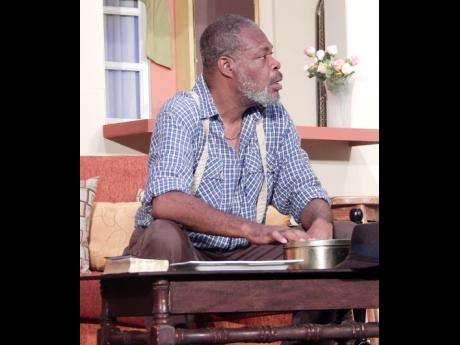For the Reckord | Veteran playwrights Gloudon and Dawkins continue to deliver
A great test of quality is longevity; the longer something lasts, the better it is deemed to be. Since playwrights are judged similarly, it follows that Barbara Gloudon and Basil Dawkins are among our best.
Gloudon has written and produced more than 30 plays (including a radio serial, Wrong Move). Dawkins is not far behind, with more than 25 to his name. Both have current productions at the theatre complex on Tom Redcam Drive. Gloudon's musical, All Aboard Fi Di Windy Rush, is at the Little Theatre, while Dawkins' domestic drama, Maas Mat Comes to Town, is at the Little Little Theatre.
The audiences at both shows, which I saw over the weekend, enjoyed them immensely. Both productions are very different in tone and content. While there are serious problems with the story structure of both - All Aboard drags, while Maas Mat lacks a climax - their other production components are generally excellent.
'All Aboard Fi Di Windy Rush'
Lasting three hours, instead of the two its material could comfortably bear, All Aboard is full of shallow talk, characters and scenes. There is no rule, of course, about how long a play should last. But ideally, dialogue, characters, and scenes should have density and do many things simultaneously. The dialogue used in a scene where men are sweet-talking unseen women is merely entertaining, the character Mr Keys is all talk and no action until the very end, and a scene showing men robbing the post office has no consequence.
The nice things about it, though, is that it's lively and has varied songs - 15 in all - including Louise Bennett's famous poem, 'Colonisation in Reverse', put to music. Musical directors Jermaine Gordon and Calvin 'Bubbles' Cameron do a pleasing job with both composition and playing in the accompanying band, with Cameron's trombone frequently lending a poignant dimension to the sound.
The visual beauty created by Lauriston Watson's art gallery makes a worthy set, and Anya Gloudon-Nelson's colourful period costumes and Michael 'Rufus' McDonald's atmospheric lighting (especially eerie in a 'mad-house' scene with actors in white masks portraying violent patients) are outstanding.
Robert 'Bobby' Clarke's direction, combined with the performers' undoubted natural talent, creates individuals of each character and guides them dynamically around the stage. Choreo-graphers Patrick Earle and George Howard contributed with entertainingly energetic steps.
Wisely, perhaps, Gloudon and the Pantomime work-shop team that assisted with the script and lyrics eschew the heavy politics of the Windrush saga (which thousands of Jamaicans who migrated to England in the 1940s and '50s and the con-temporary repercussions that followed). Instead, they have at the heart of the story a simple tale of love between a farmer who wants to stay in Jamaica and a teacher who wants to leave.
'Maas Mat'-the sequel
For years, Dawkins' plays have teetered on the edge of heavy drama. Of his last production, I had written, "Pressure Drop is much more serious than comic, and its grave subjects keep pushing it towards tragedy up to the last scene. In fact, as the final lights fade, we feel that the bush tonic and powder offered as a remedy to a major health problem might not be effective."
Maas Mat Comes to Town is a sequel to that near-tragic story, and three of the characters return. Again, Mat, his daughter-in-law Deslin, and her mother Dotsy are played by Earle Brown, Maylynne Lowe and Ruth Ho Shing, respectively. (Ho Shing is celebrating 47 years in theatre, and the production formally honours her).
As I thought probable, the bush tonic and powder offered as a cure for Deslin's alcoholism were not effective. In Maas Mat, Deslin is still a slave to white rum and is still abusing her mother.
That abuse, which occurs through act one, is painful to watch. Happily, a miracle occurs in the second act, and the play again switches from being a heavy drama to a 'dramedy', the comedy-drama Dawkins usually writes. The previously sombre, but engaged audience can then laugh freely.
The problem is that in act two, Dawkins breaks the 'show, don't tell' guideline for writers, and in the last quarter of the play, where there usually is an action-filled, onstage climax (usually a clash between characters), there are discussions and explanations of past offstage events and attitudes.
However, following all the talk, Dawkins twists the tale around in extraordinary fashion and asks the audience to take a radically different view of the afterlife. The directing by E. Wayne McDonald and the acting he elicited are about as flawless as one can get.





